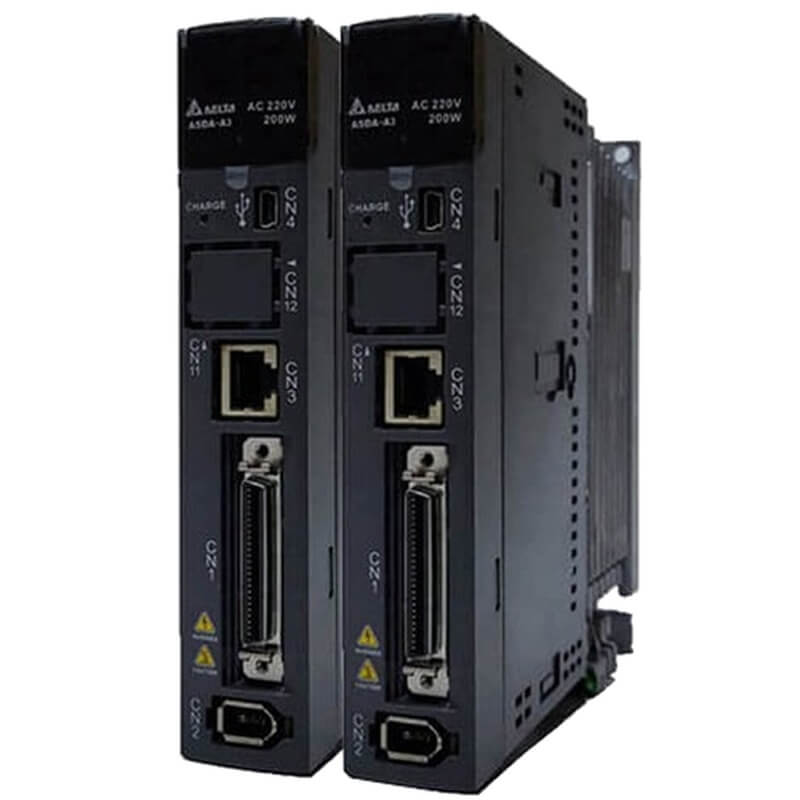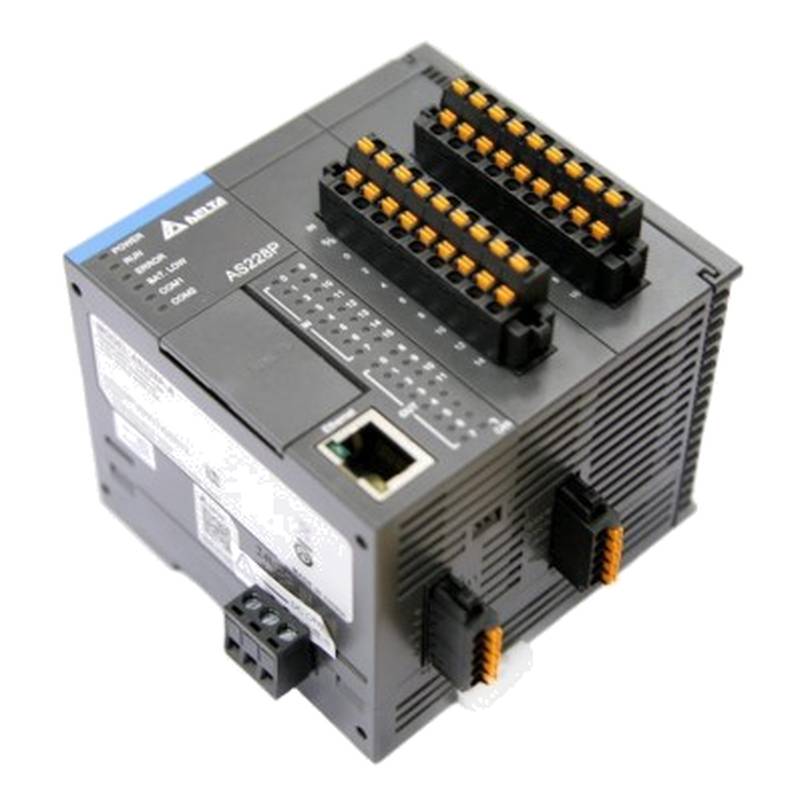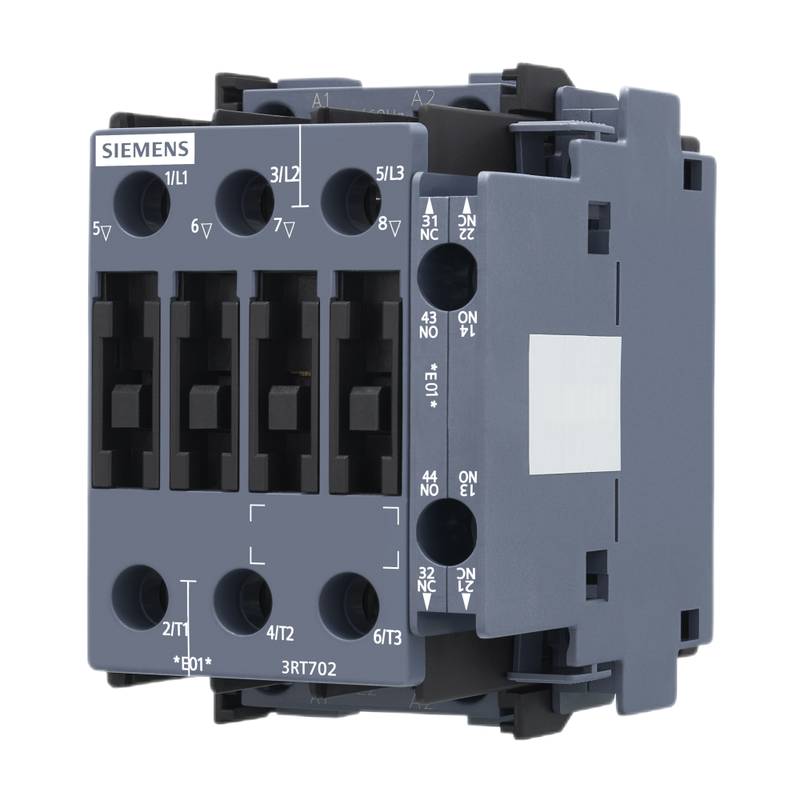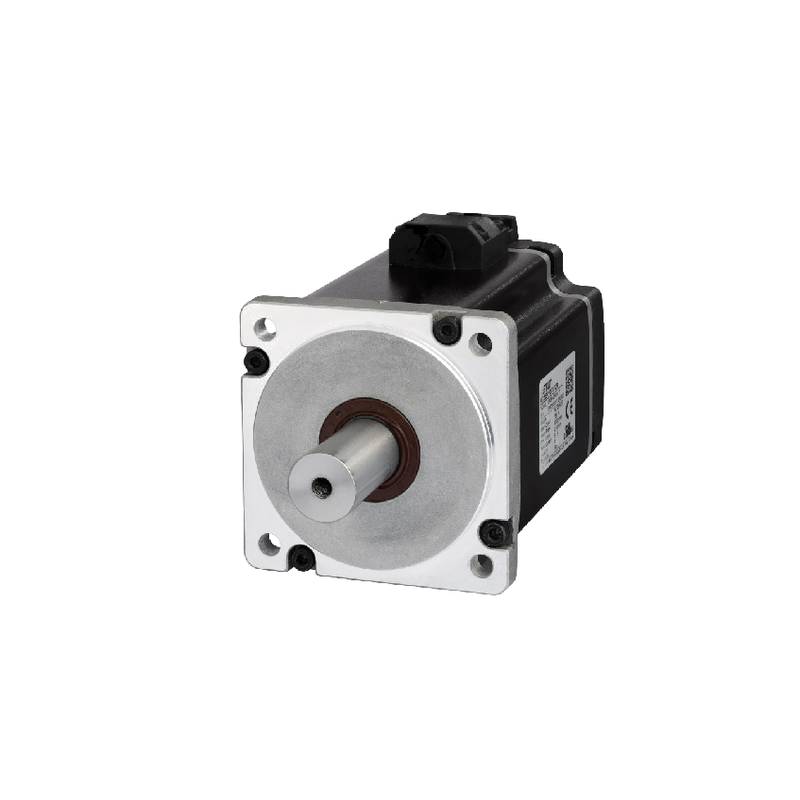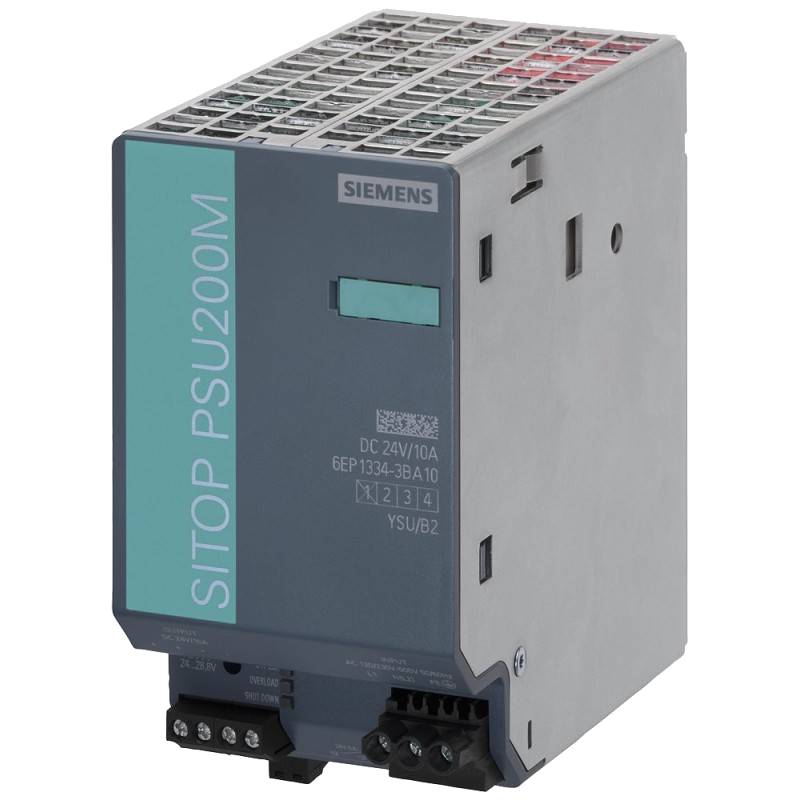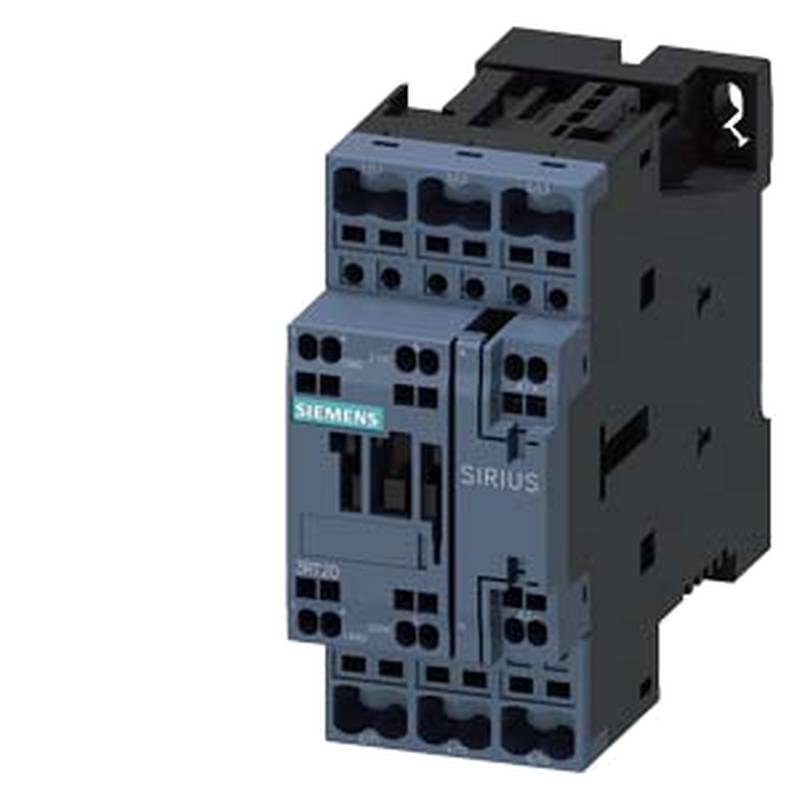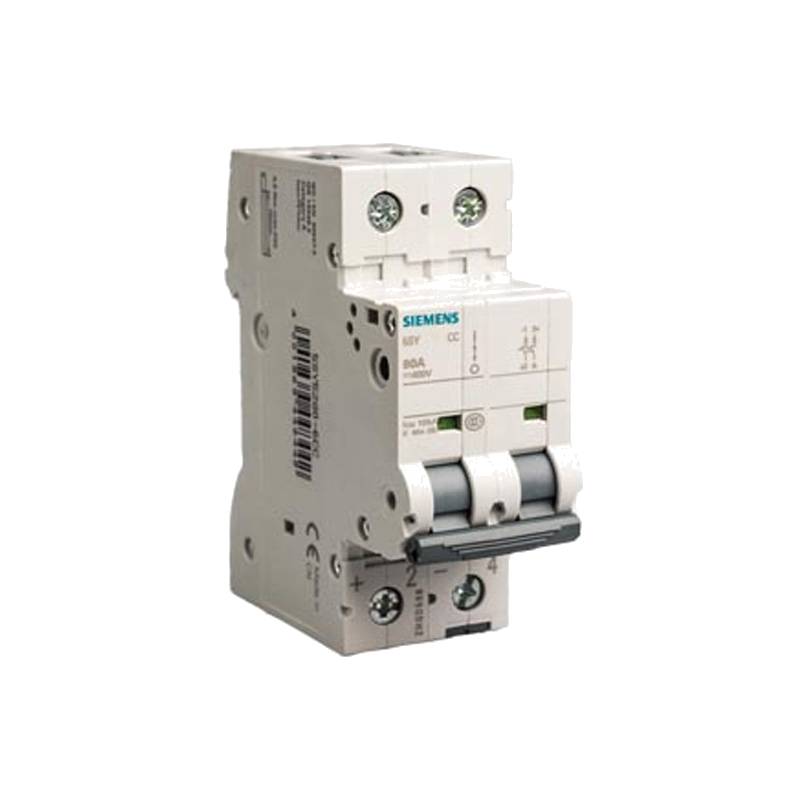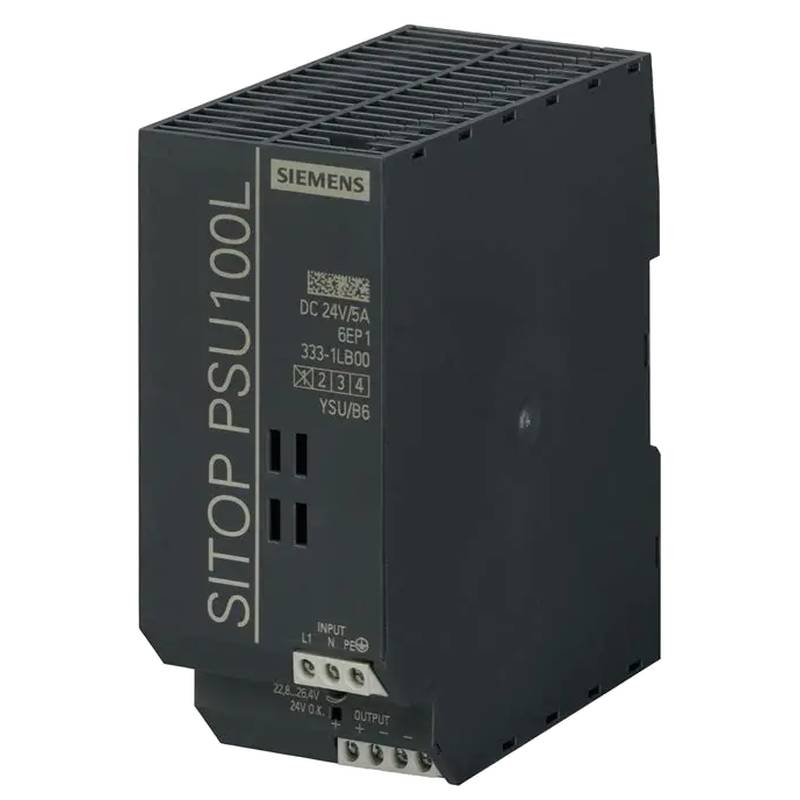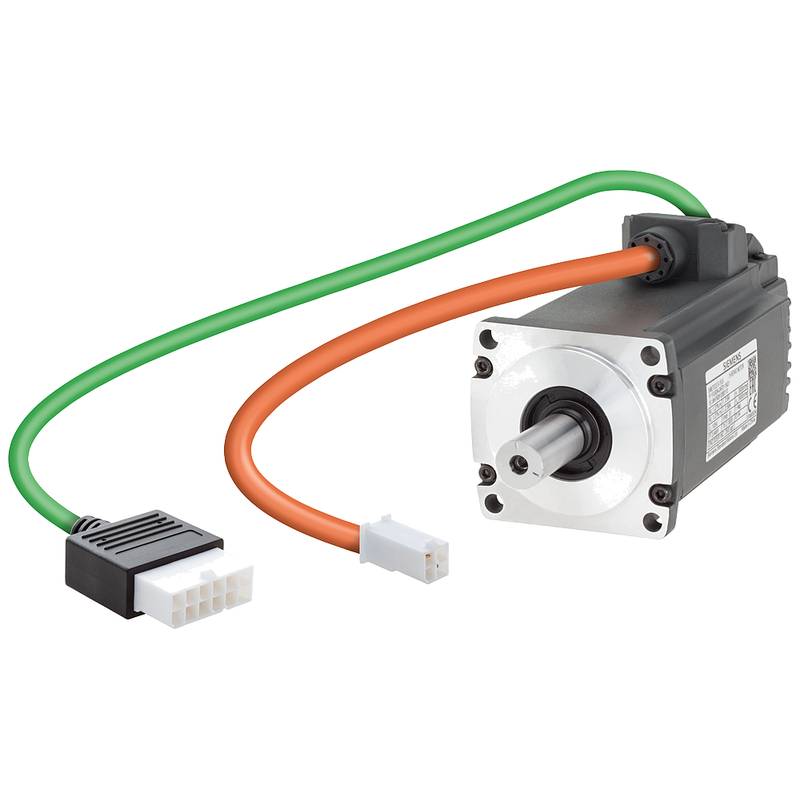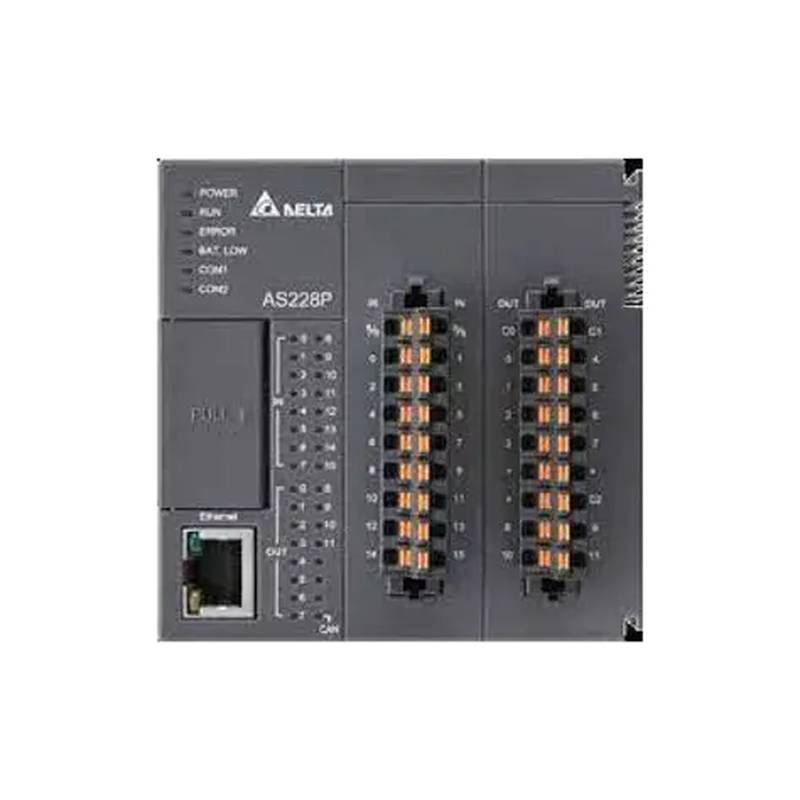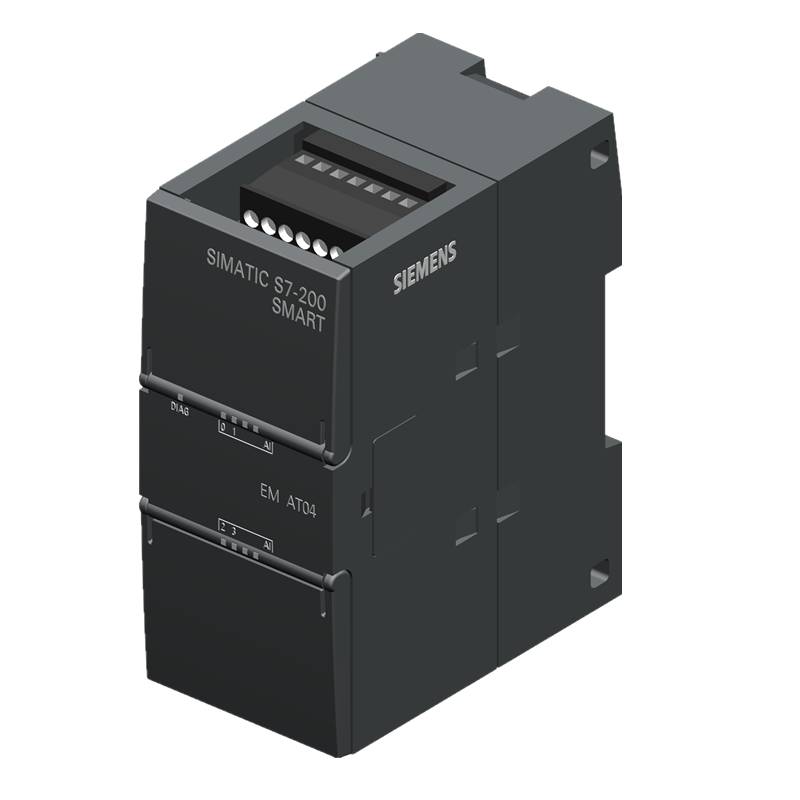
The Delta ASD-E3-0421-E is a high-performance standard servo drive designed for a wide array of industrial automation applications. This drive delivers precise motion control, boasting a 400W rated output power and operating within a 220V input voltage range, often supporting single-phase or three-phase configurations. Its advanced capabilities include a 3.1 kHz bandwidth and compatibility with 24-bit encoders, ensuring high responsiveness and accurate positioning essential for demanding tasks. The ASD-E3-0421-E is noted for its compact design, making it suitable for space-constrained environments, and features like Safe Torque Off (STO) for enhanced operational safety. Furthermore, it offers robust communication options, including RS485 and support for EtherCAT, facilitating seamless integration into networked industrial systems.
Product Specifications
| Feature | Specification |
| :---------------------- | :--------------------------------------------------- |
| Modard | Delta ASD-E3-0421-E |
| Rated Output Power | 400 W |
| Input Voltage | 220 VAC |
| Input Phase | 1/3 PH |
| Bandwidth | 3.1 kHz |
| Encoder Resolution | 24-bit |
| Motor Support | Up to 6000 r/min |
| Communication Interface | RS485, EtherCAT (E3-E models) |
| Protection Level | IP65 (for some variants) |
| Key Features | STO, DC Bus Sharing, Vibration Suppression, Auto-Tuning |
Core Features & Market Positioning
The Delta ASD-E3-0421-E servo drive distinguishes itself through a combination of advanced features and robust performance that positions it as a competitive solution in the industrial automation market. Its high bandwidth of 3.1 kHz, coupled with a 24-bit encoder, provides superior precision and speed control, making it ideal for applications demanding fine-tuned movements. The drive's compatibility with both ASDA-A3 and ASDA-A2 series servo motors offers flexibility for upgrades or new installations, leveraging Delta's established motor technology. Market analysis indicates a strong emphasis on ease of integration and operation, with features like auto-tuning and system diagnosis software simplifying setup and maintenance. The inclusion of STO (Safe Torque Off) underscores its commitment to safety, a critical factor in industrial settings. Compared to its predecessors, such as the ASDA-A2 series, the ASD-E3 series offers smaller drive and motor sizes, alongside improved control accuracy. This focus on enhanced performance, user-friendliness, and safety features allows the Delta ASD-E3-0421-E to effectively compete in various demanding automation sectors.
Key Application Scenarios
The versatility of the Delta ASD-E3-0421-E servo drive makes it suitable for a broad spectrum of industrial applications where precise and reliable motion control is paramount. Its high-speed, high-precision capabilities are particularly beneficial in machinery for manufacturing and assembly lines, where accurate pick-and-place operations, component insertion, and complex trajectory following are critical. Applications in packaging machinery, printing equipment, and textile manufacturing can leverage the drive's ability to execute rapid and repeatable movements with minimal error. The drive's robust performance also lends itself to robotics, enabling smoother and more dynamic arm movements for industrial robots involved in welding, painting, or material handling. Furthermore, its compatibility with communication protocols like EtherCAT allows for seamless integration into sophisticated automated systems, such as those found in the semiconductor manufacturing or logistics industries, facilitating coordinated multi-axis control and real-time data exchange.
Practical System Integration Guidance
Integrating the Delta ASD-E3-0421-E into an industrial control system involves careful consideration of wiring, parameter configuration, and motor selection. Delta provides comprehensive documentation, including user manuals and configuration software like ASDA-Soft, to facilitate this process. Proper wiring is crucial for both power and control signals; typically, the drive requires a 220V AC input (single or three-phase depending on the model) and connects to the servo motor via shielded cables to minimize electromagnetic interference. For control, inputs for pulse train, analog voltage, or digital signals are available, alongside communication ports like RS485 and EtherCAT for advanced integration.
Parameter configuration is managed through the ASDA-Soft software or direct input via the drive's interface. Key parameters include motor identification, feedback settings (encoder type and resolution), and motion control settings such as speed, position, and torque limits. Auto-tuning functions are invaluable for optimizing performance by automatically adjusting PID control loops based on the connected motor and system dynamics, reducing manual setup time and improving system stability. When selecting a motor, ensure compatibility with the ASD-E3-0421-E, considering its 400W power rating and the motor's specifications for voltage, current, and torque.
Operation and Risk Mitigation
Safe and efficient operation of the Delta ASD-E3-0421-E servo drive relies on adherence to operational guidelines and understanding potential risks. The drive incorporates safety features such as Safe Torque Off (STO), which provides a reliable method to disengage motor torque in emergency situations by disabling the power stage, thereby preventing unexpected movements. It is imperative to follow wiring diagrams precisely, ensuring proper grounding and connection of all power and control lines to prevent electrical hazards and operational failures. Before applying power, confirm that the motor is not subject to unintended rotation due to mechanical inertia or other forces.
Troubleshooting common issues often involves checking error codes displayed on the drive or through connected software. While specific fault codes for the ASD-E3-0421-E are detailed in the user manual, common problems can include overcurrent, overvoltage, undervoltage, or encoder errors. Addressing these typically involves verifying power supply stability, checking motor connections and encoder feedback, and ensuring the drive is not overloaded beyond its rated capacity. For instance, an overcurrent fault might necessitate a review of acceleration/deceleration profiles or the load on the motor. Regular maintenance, including keeping ventilation paths clear and inspecting connections, also plays a role in mitigating operational risks and ensuring long-term reliability.
Scalability & Long-Term Value
The Delta ASD-E3-0421-E servo drive offers significant scalability and long-term value, primarily through its compatibility with Delta's broader automation ecosystem and its support for advanced communication protocols. The drive's ability to integrate with various Delta servo motors, including older ASDA-A2 series, allows for phased upgrades and system expansions without requiring a complete overhaul. This backward compatibility ensures that existing Delta servo systems can be enhanced with the newer, more capable E3 series drives, maximizing the return on investment for established infrastructure.
Moreover, the support for industrial communication standards like EtherCAT positions the ASD-E3-0421-E for integration into future-proofed smart factory environments and IIoT (Industrial Internet of Things) solutions. EtherCAT enables high-speed, deterministic communication, allowing for sophisticated multi-axis synchronization and real-time data acquisition necessary for advanced analytics, predictive maintenance, and process optimization. Delta's continuous development of configuration software and firmware updates also contributes to the long-term value, ensuring the drive can adapt to evolving automation requirements and benefit from performance enhancements over its lifecycle.
Frequently Asked Questions
Q1: What are the primary advantages of the Delta ASD-E3-0421-E servo drive?
The Delta ASD-E3-0421-E offers a high bandwidth of 3.1 kHz for precise motion control. Its 24-bit encoder ensures exceptional positioning accuracy. The drive is designed for ease of integration and features STO safety.
This model provides excellent vibration suppression and auto-tuning capabilities. Its compact design also makes it ideal for space-constrained applications. It supports various communication protocols for system flexibility.
The drive boasts energy-efficient operation and compatibility with Delta's ASDA-A2 and A3 servo motors. This ensures flexibility for upgrades and a reliable long-term solution.
Q2: What types of applications is the Delta ASD-E3-0421-E suitable for?
This servo drive is well-suited for high-precision applications like robotics and CNC machinery. It excels in tasks requiring rapid, repeatable movements.
Industries such as packaging, printing, and electronics manufacturing benefit from its performance. Its advanced motion control functions are ideal for complex automation tasks.
The drive's EtherCAT support allows integration into advanced manufacturing systems. This includes areas like semiconductor production and automated logistics.
Q3: What are the key technical specifications of the Delta ASD-E3-0421-E?
The Delta ASD-E3-0421-E features a rated output power of 400W. It operates on a 220V AC input voltage, supporting single or three-phase power.
Its bandwidth is 3.1 kHz, and it is compatible with 24-bit encoders. The drive supports motor speeds up to 6000 rpm.
It includes features like STO, DC Bus Sharing, and communication interfaces like RS485 and EtherCAT. Some variants offer an IP65 protection level.
Q4: How does the Delta ASD-E3-0421-E compare to the ASDA-A2 series?
The ASD-E3-0421-E offers improved control accuracy and finer grain control over the ASDA-A2. It features a higher bandwidth of 3.1 kHz compared to the A2 series.
Drives and motors in the E3 series are generally smaller than their A2 counterparts. This compact design is beneficial for space-saving installations.
The E3 series drives are compatible with both A3 and A2 motors, providing upgrade path flexibility. They also support advanced features like EtherCAT communication.
Q5: What communication protocols does the Delta ASD-E3-0421-E support?
The Delta ASD-E3-0421-E supports RS485 communication for standard industrial networking. This allows for straightforward integration into many control systems.
For higher-speed, synchronized applications, it offers EtherCAT communication. This protocol is crucial for advanced automation and IIoT integration.
Note that EtherCAT support is primarily available on the E3-E model variants. Always check the specific model number for communication capabilities.
Q6: Can the Delta ASD-E3-0421-E be used with older Delta servo motors?
Yes, the ASDA-E3 series drives are compatible with Delta's ASDA-A2 series servo motors. This ensures a smooth upgrade path for existing systems.
The drives are also compatible with ASDA-A3 series motors. This broad compatibility offers flexibility in motor selection for new projects.
Always verify the motor's specifications against the drive's capabilities. Ensure proper matching for optimal performance and safety.
Q7: What safety features are included in the Delta ASD-E3-0421-E?
A key safety feature is Safe Torque Off (STO). This function safely disengages motor torque without needing to power down the entire system.
The drive is designed to prevent unexpected movements. Following proper wiring and installation procedures is critical for safety.
Refer to the user manual for detailed safety instructions. Always ensure emergency stop procedures are in place.
Q8: How do I perform auto-tuning with the Delta ASD-E3-0421-E?
The auto-tuning function is accessible via the drive's interface or Delta's ASDA-Soft configuration software. It automatically adjusts control parameters for optimal performance.
Ensure the motor is correctly connected and identified by the drive. The auto-tuning process typically involves running the motor through a series of tests.
This function significantly simplifies setup and improves system stability. It helps achieve precise motion control without extensive manual parameter adjustment.
Q9: What is the typical power output and input voltage for the Delta ASD-E3-0421-E?
The Delta ASD-E3-0421-E typically has a rated output power of 400 Watts. This is suitable for a wide range of moderate-load applications.
The drive usually operates with an input voltage of 220 VAC. It can often be powered by either single-phase or three-phase sources.
Always confirm the specific model's power and voltage ratings. This ensures compatibility with your system's power supply.
Q10: Where can I find documentation and software for the Delta ASD-E3-0421-E?
Official documentation, including user manuals and installation guides, is available on Delta's download center. You can find CAD files and technical specifications there.
Configuration software, such as ASDA-Soft, is also provided by Delta. This software is essential for parameter setup, diagnostics, and tuning.
Check Delta's website for the latest versions of firmware and software. This ensures you have access to the most up-to-date features and support.














